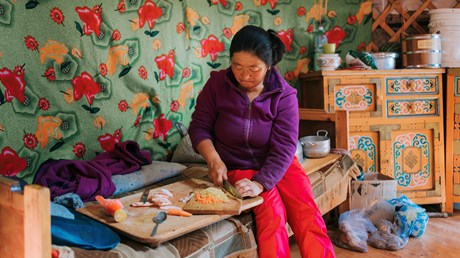Believers are learning how to celebrate and evangelize amid Tsagaan Sar's Buddhism-infused rituals.

Before college students travel home to celebrate Tsagaan Sar, Mongolia’s Lunar New Year, Dagdansengee Delgersaikhan, the general secretary of the student ministry IFES in Mongolia, discusses with the students how to approach the country’s biggest holiday with their new Christian faith.
It’s good to respect your parents, Delgersaikhan tells them, but there are certain rituals steeped in Buddhism and shamanism that they can no longer take part in, such as bowing to family idols or walking in a certain direction for good luck. She guides them on how to keep good relationships with their family while kindly explaining that, because they are Christians, they can no longer join in on some of the traditions.
Delgersaikhan speaks from experience. She remembers 20 years ago when she approached her father nervously on the morning of Tsagaan Sar and told him that she wouldn’t be joining the rest of the family as they went out to perform prayers. Instead, she would stay home and make them a hot pot of milk tea for when they returned home. He agreed.
For Christians in the majority Buddhist country, celebrating Tsagaan Sar—which begins Saturday—looks different from before they came to faith. Some Christians do not engage in the holiday at all because of its spiritual roots, while others find ways to embrace the positive aspects of spending time with family and respecting elders while refraining from practices that conflict with their faith.
The gathering of so many people also makes it “a good time to testify about Jesus,” Delgersaikhan said. Conversations about faith can pop up over preparing buuz, steamed meat dumplings, or during visits to the homes of relatives.
“We encourage them that ...
from Christianity Today Magazine
Umn ministry


.gif)

.gif)
.gif)
